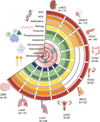Proteogenomic data and resources for pan-cancer analysis
- PMID: 37582339
- PMCID: PMC10506762
- DOI: 10.1016/j.ccell.2023.06.009
Proteogenomic data and resources for pan-cancer analysis
Abstract
The National Cancer Institute's Clinical Proteomic Tumor Analysis Consortium (CPTAC) investigates tumors from a proteogenomic perspective, creating rich multi-omics datasets connecting genomic aberrations to cancer phenotypes. To facilitate pan-cancer investigations, we have generated harmonized genomic, transcriptomic, proteomic, and clinical data for >1000 tumors in 10 cohorts to create a cohesive and powerful dataset for scientific discovery. We outline efforts by the CPTAC pan-cancer working group in data harmonization, data dissemination, and computational resources for aiding biological discoveries. We also discuss challenges for multi-omics data integration and analysis, specifically the unique challenges of working with both nucleotide sequencing and mass spectrometry proteomics data.
Keywords: CPTAC; data harmonization; multi-omics; open data; pan-cancer; proteogenomics.
Copyright © 2023 The Authors. Published by Elsevier Inc. All rights reserved.
Conflict of interest statement
Declaration of interests F.A. is an inventor on a patent application related to SignatureAnalyzer-GPU filed by the Broad Institute and is an employee and shareholder of Illumina Inc. since 8 November 2021.
Figures




References
Publication types
MeSH terms
Grants and funding
- U24 CA210954/CA/NCI NIH HHS/United States
- U01 CA214116/CA/NCI NIH HHS/United States
- 75N91019D00024/CA/NCI NIH HHS/United States
- U24 CA210985/CA/NCI NIH HHS/United States
- R33 CA263705/CA/NCI NIH HHS/United States
- U24 CA210986/CA/NCI NIH HHS/United States
- U24 CA271075/CA/NCI NIH HHS/United States
- U24 CA270823/CA/NCI NIH HHS/United States
- U24 CA210972/CA/NCI NIH HHS/United States
- U24 CA210955/CA/NCI NIH HHS/United States
- P30 ES017885/ES/NIEHS NIH HHS/United States
- U24 CA210993/CA/NCI NIH HHS/United States
- U24 CA210979/CA/NCI NIH HHS/United States
- T32 CA203690/CA/NCI NIH HHS/United States
- T32 GM136542/GM/NIGMS NIH HHS/United States
- U24 CA210967/CA/NCI NIH HHS/United States
- U24 CA271012/CA/NCI NIH HHS/United States
- U01 CA214114/CA/NCI NIH HHS/United States
- U01 CA214125/CA/NCI NIH HHS/United States
LinkOut - more resources
Full Text Sources
Medical
Miscellaneous

